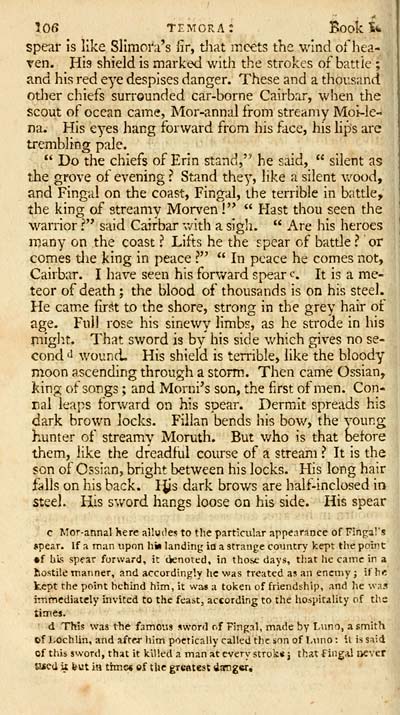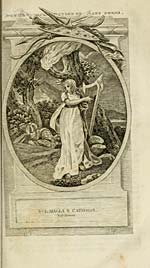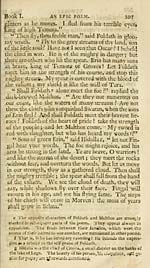Download files
Complete book:
Individual page:
Thumbnail gallery: Grid view | List view

lOG temgra: BookU
spear is like Slimora's fir, tJiat ir.cets the wind of hea-
ven. His shield is marked with the strokes of battle ;
and his red eye despises danger. These and a thousand
other chiefs surrounded car-borne Cairbar, when the
scout of ocean came, Mor-annal from streamy Moi-le-
na. His eyes hang forward from his face, his Hps are
trembling pale.
" Do the chiefs of Erin stand," he said, " silent as
the grove of evening ? Stand they, like a silent v/ood,
and Fingal on the coast, Fingal, the terrible in battle,
the king of streamy Morven !" " Hast thou seen the
warrior ?" said Cairbar v/ith a sigh. " Are his heroes
many on the coast ? Lifts he the spear of battle ? or
comes tlie king in peace ?" " In peace he comes not,
Cairbar. I have seen his forward spear c. It is a me-
teor of death ; the blood of thousands is on his steel.
He cam.e fir^tt to the shore, strong in the grey hair of
age. Full rose his sinewy limbs, as he strode in his
miglit. That sword is by his side v/hich gives no se-
cond J woundw His shield is terrible, like the bloody
moon ascending through a storm. Then came Ossian,
king of songs ; and Morni's son, the first of men. Con-
ral leaps forward on his spear. Dermit spreads his
dark brown locks. Fillan bends his bow, the young
hunter of streamy Moruth. But v/ho is that tetore
them, like the dreadful course of a stream ? It is the
son of Ossian, bright between his locks. His long hair
falls on his back. I^s dark brows are half-inclosed in
steel. His sword hangs loose on his side. His spear
c Mor-annal here alludes to the particular appearance of Fingal's
*pear. If a man upon liii landin;,' in a strange country kept the point
•f bis spear forward, it cienoted, in those days, tl:at he came in a
hostile manner, and accordingly lie was treated as an enemy j if he
kept the point behind him, it was a token of friendship, and he was
immediately invited to the feast, according to the hospitality of the
times.
d This was the famous sword of Fingal, made by Luno, a smith
of Lochlin, and after him poetically called the son of I,\mo : il is said
of this sword, that it killed a man at every strok* j that fingal iKver
u«ed it but iH thne* ef the greatest damger*
spear is like Slimora's fir, tJiat ir.cets the wind of hea-
ven. His shield is marked with the strokes of battle ;
and his red eye despises danger. These and a thousand
other chiefs surrounded car-borne Cairbar, when the
scout of ocean came, Mor-annal from streamy Moi-le-
na. His eyes hang forward from his face, his Hps are
trembling pale.
" Do the chiefs of Erin stand," he said, " silent as
the grove of evening ? Stand they, like a silent v/ood,
and Fingal on the coast, Fingal, the terrible in battle,
the king of streamy Morven !" " Hast thou seen the
warrior ?" said Cairbar v/ith a sigh. " Are his heroes
many on the coast ? Lifts he the spear of battle ? or
comes tlie king in peace ?" " In peace he comes not,
Cairbar. I have seen his forward spear c. It is a me-
teor of death ; the blood of thousands is on his steel.
He cam.e fir^tt to the shore, strong in the grey hair of
age. Full rose his sinewy limbs, as he strode in his
miglit. That sword is by his side v/hich gives no se-
cond J woundw His shield is terrible, like the bloody
moon ascending through a storm. Then came Ossian,
king of songs ; and Morni's son, the first of men. Con-
ral leaps forward on his spear. Dermit spreads his
dark brown locks. Fillan bends his bow, the young
hunter of streamy Moruth. But v/ho is that tetore
them, like the dreadful course of a stream ? It is the
son of Ossian, bright between his locks. His long hair
falls on his back. I^s dark brows are half-inclosed in
steel. His sword hangs loose on his side. His spear
c Mor-annal here alludes to the particular appearance of Fingal's
*pear. If a man upon liii landin;,' in a strange country kept the point
•f bis spear forward, it cienoted, in those days, tl:at he came in a
hostile manner, and accordingly lie was treated as an enemy j if he
kept the point behind him, it was a token of friendship, and he was
immediately invited to the feast, according to the hospitality of the
times.
d This was the famous sword of Fingal, made by Luno, a smith
of Lochlin, and after him poetically called the son of I,\mo : il is said
of this sword, that it killed a man at every strok* j that fingal iKver
u«ed it but iH thne* ef the greatest damger*
Set display mode to: Large image | Transcription
Images and transcriptions on this page, including medium image downloads, may be used under the Creative Commons Attribution 4.0 International Licence unless otherwise stated. ![]()
| Early Gaelic Book Collections > Ossian Collection > Poems of Ossian, the son of Fingal > Volume 2 > (116) |
|---|
| Permanent URL | https://digital.nls.uk/77914181 |
|---|
| Shelfmark | Oss.54 |
|---|---|
| Attribution and copyright: |
|
| Description | Selected books from the Ossian Collection of 327 volumes, originally assembled by J. Norman Methven of Perth. Different editions and translations of James MacPherson's epic poem 'Ossian', some with a map of the 'Kingdom of Connor'. Also secondary material relating to Ossianic poetry and the Ossian controversy. |
|---|
| Description | Selected items from five 'Special and Named Printed Collections'. Includes books in Gaelic and other Celtic languages, works about the Gaels, their languages, literature, culture and history. |
|---|

